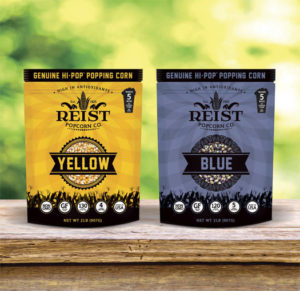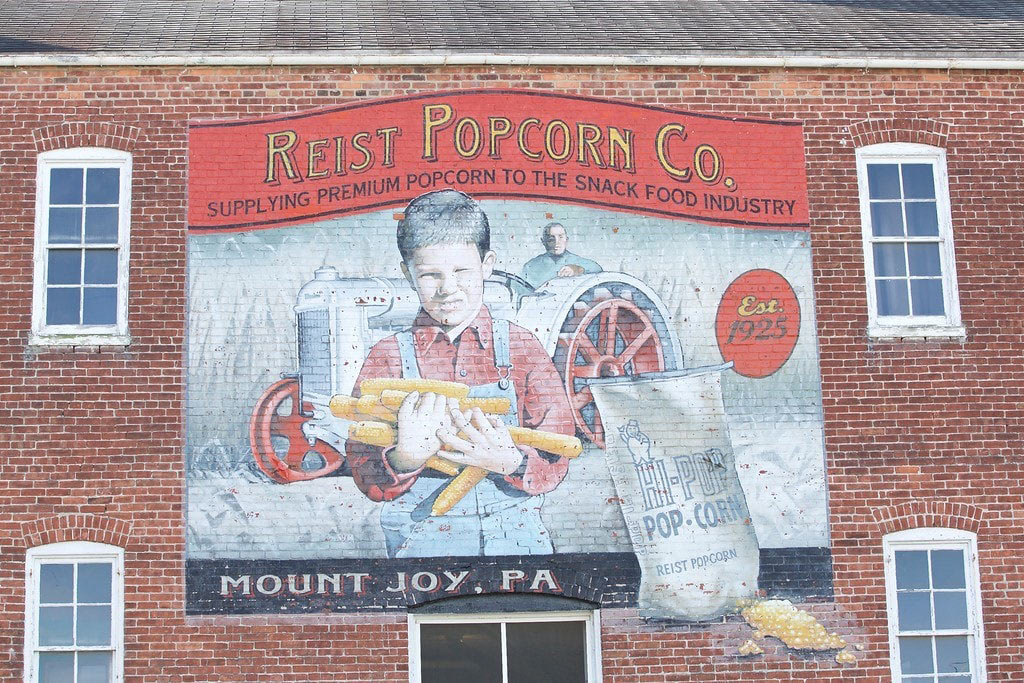What started out as a side business to occupy Pennsylvania’s winter months is keeping the Reist family’s third and fourth generations fully occupied—in the booming market of non-GMO snacks. Reist Popcorn Co. processes around 100,000 lbs. per day at its Mount Joy, PA processing plant—supplying snack manufacturers, distributors, and concessionaires with eight non-GMO and two organic popcorn varieties. It also operates a full service bulk transloading terminal for grains, providing a gateway to the East from Midwest rail points.
Alvin Reist founded Reist Seed Co. in 1925, selling a variety of farm seeds to local farmers. After a few successful years he produced his own brand called Reist Hybrids, which included field corn, PA certified barley, and wheat. During the mid-1930s, Alvin developed a mobile seed cleaning business and processed popcorn during the off-season. Son Henry and grandson David joined later, and business moved from the family farm to Mount Joy. But when seed companies introduced private genetics, seeds no longer needed cleaning…and with popcorn becoming a popular snack, the company narrowed its focus.
Popcorn: safely non-GMO
The corn is grown in Pennsylvania, Ohio, Indiana, Illinois, and Nebraska, and shipped by truck and rail to the plant in Lancaster County. All varieties of popcorn are non-GMO, said Mike Higgins, the fourth generation son-in-law. “A few years back, the popcorn industry decided popcorn should not go GMO—this was largely driven from customer demand.”

Reist Popcorn’s facility in Mount Joy, Pennsylvania
Reist uses a generic non-GMO label, requested by manufacturers. Contamination is not a threat—popcorn is a dent sterile corn, meaning it can’t receive pollen from other (dent) corn varieties.
The company has cultivated long-term relationships with a robust inventory of growers. “Our clients want different things: some want big, soft kernels, some smaller; some white, some yellow; they choose for texture, mouth-feel, taste, crunch, popping expansion,” Higgins says.
The company has supplied bulk organic popcorn for many years, and demand is increasing. All products comply with National Organic Program standards. “We would consider Non-GMO Project verification if it would bolster sales in the retail part of our business,” Higgins said. “Many commercial companies are not doing organic; it’s difficult to break into. Our organic percentage vacillates—now we’re 15% organic, with two varieties. Soon we’ll introduce an organic white variety.”
Once the popcorn is harvested—at optimum time for moisture content—the kernels are dried in large bins. The popcorn is separated by size and gravity, scanned for discoloration (off-color kernels removed), and passed over magnets to remove ferrous material. Samples are taken to check moisture, popping expansion, and kernel size. Then they’re packaged and ready to ship.
Agrarian hub
Reist Popcorn is situated in Lancaster County, an area rich in agricultural heritage. “Lancaster County feeds New York City” is the saying. Large volumes of dairy, egg, and pork production necessitate large amounts of animal feed—making the area a huge grain import location. Situated close to the ports of Baltimore, Philadelphia, and New York, the region also is home to quite a few Amish family farmers, both organic and conventional.
The foray into transloading was Mike’s idea, prompted by a desire to diversify the company while also solving one of its primary challenges.
“When I joined in 2009, I was looking for a more efficient way to truck in our popcorn from the Midwest. We located a lumberyard that had railroad lines buried beneath asphalt—we bought the property for the railroad access, then resurrected the lines, rebuilding the rail in 2012. As adjacent properties became available, we bought them and added storage bins.”
The transloading business includes temporary storage for grains servicing the snack food, pet food, and livestock feed industries. Soybeans and meal, corn, sunflower meal, and wheat are some of the organic products serviced by the hub, operating through Norfolk Southern Railroad Service.
Though transloading is only 15 to 20 percent of Reist Popcorn’s revenue, it’s been an asset. “We wanted to diversify into other revenue streams that we could use same equipment for,” Higgins explained.
Managing resources
The primary challenge facing the company is its size, Higgins said. Reist has to compete against large corporations with huge dollars in resources, necessitating careful resource management. Popcorn has seen steady growth since 2006 growing from 900 million lbs. to 1.2 billion lbs. in the U.S.
Reist’s business is hopping, with a retail brand launched in June—2 lb. bags of yellow and blue butterfly kernels. An organic line will follow.
Higgins finds satisfaction in fulfilling his original vision, and working with a dedicated group of nine employees in a positive corporate culture. “It’s all about the team,” he said.





